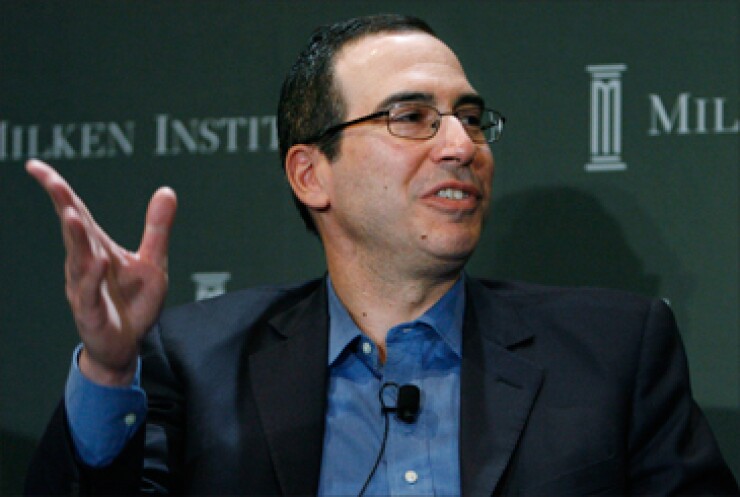
Before Steven Mnuchin became a possible candidate for Treasury secretary, he was a driving force behind one of the most controversial banking turnarounds during the financial crisis.
Mnuchin was the
Mnuchin, who spent nearly two decades at Goldman Sachs, had drawn attention in recent years for a big gamble he and fellow investors took in commercial banking. He was instrumental in the recapitalization of the failed mortgage lender IndyMac, its return to financial health as OneWest Bank and its ultimate sale it to CIT Group in a lucrative deal. He joined the CIT board after the 2015 sale and has since pushed the $66 billion-asset company to slim down and boost returns.
How that experience would translate into a career in public service is unclear. Though Mnuchin — who has never held public office — has a track record of success in financial services, there have also been hiccups along the way, including criticism from community groups for ignoring the needs of underserved communities.
"He took a company that was a very visibly failed institution of the mortgage crisis and rehabilitated it," said Vincent Caintic, an analyst with Stephens. "He made it into a stable and viable company and sold it successfully for double the money."
Caintic said that Mnuchin's experience rehabilitating companies could bode well for a career in government. Additionally, the fact that he worked closely with regulators, negotiating the terms of a failed-bank acquisition, could work in his favor.
But memories of Mnuchin's crisis-era move into banking still gnaw at some community activists. Mnuchin in 2009 led a group of Wall Street investors — including George Soros and John Paulson — in rebuilding IndyMac under the OneWest brand.
"In some ways, the bank was the poster child for income inequality," said Kevin Stein, deputy director at the California Reinvestment Coalition, noting the disconnect between the high-profile bank investors and borrowers who were struggling during the crisis to pay their mortgages.
Stein said that the company generated ill will around its Pasadena, Calif., footprint, in particular,
Financial Freedom is currently under investigation by the Department of Housing and Urban Development for issues related to its accounting. CIT has discontinued the business.
The deal also was one of those that attracted intense scrutiny because of the windfall it generated for private-equity investors, former Federal Deposit Insurance Corp. Chair
Though a nomination is uncertain, especially in as fluid a situation as the days following Trump's stunning win over Hillary Clinton, it would mark a career shift for Mnuchin, a financial executive who has had a
Mnuchin began his financial services career in 1985 at Goldman, where he ultimately rose to partner and chief information officer. He
Outside of his career in banking, he has also earned a reputation in film. He has helped finance hit movies such as
Within the world of bread-and-butter banking, though, Mnuchin has earned a reputation for getting results.
Mnuchin decided to enter the business back in 2008, when he saw a TV news shot of customers lined up outside of the $32 billion-asset IndyMac, hoping to withdraw their money. He decided that the time was right to buy a bank, according to a
He led a group of investors who bought the assets of IndyMac in 2009,
As chairman of the newly formed OneWest, Mnuchin helped lead a rapid turnaround. The company moved away from risky mortgage loans and sought to become a more of a "full-service" regional bank with additional branches, according to Caintic.
In August 2015, OneWest was sold to CIT, which was run at the time by Wall Street icon John Thain. The deal pushed CIT — another crisis-era turnaround story — above the threshold to be considered a systemically important financial institution.
A key priority of Thain was asset growth and burnishing CIT's reputation as a major industry player. But Mnuchin has been influential in pushing CIT to focus, instead, on boosting returns and simplifying its business model.
Mnuchin was a key figure behind CIT's decision last year to shed its costly aircraft-leasing business, according to Caintic. The company announced plans to sell it last fall; Thain at the same time announced his intention to step down. Thain was succeeded earlier this year by Ellen Alemany, who currently serves as chairman and CEO and was previously a member of the CIT board.
CIT's acquisition of OneWest encountered a number of challenges. The reverse-mortgage business has had significant problems with its accounting. There have also been issues with culture clashes between the two companies.
The deal also received significant pushback from community activists, who criticized the foreclosure policies at OneWest and its overall commitment to working with underserved communities.
In approving the deal, regulators required CIT to revise its plan to comply with the Community Reinvestment Act
"What we know of [Mnuchin] is in relation to OneWest Bank, which we found to be very problematic," Stein said.
Still, both at OneWest and now on the board of CIT, Mnuchin has backed decisive actions that benefit shareholders.
CIT, for instance, is in the midst of a multiyear effort to boost its return on average common equity above 10%, in part through significant cost cuts. As of the third quarter that figure stood at 7.5%.
"I think they have been a positive influence on getting CIT back on track," Caintic said. "Mnuchin has been a key person in pushing for that type of execution."





